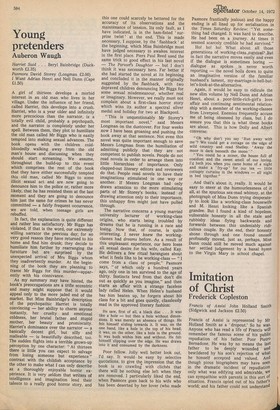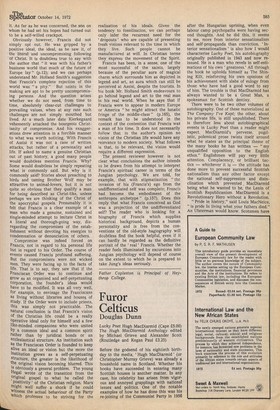Imitation of Christ
Frederick Copleston
Francis of Assisi John Holland Smith (Sidgwick and Jackson £2.50) Francis of Assisi is represented by Mr Holland Smith as a 'dropout.' So he was. Anyone who has read a life of Francis will remember the famous scene of his public repudiation of his father. Poor Pietro Bernadone. He was by no means the last father to be deeply wounded and bewildered by his son's rejection of what he himself accepted and valued. And though pious biographers may have seen in the dramatic incident of repudiation only what was edifying and admirable, 'we can sympathise with parents in this sort of situation. Francis opted out of his father s world; and his father could not understand
it. As far as he was concerned, the son on whom he had set his hopes had turned out to be a self-willed crackpot.
Obviously however, Francis did not simply opt out. He was gripped by a positive ideal, the ideal, as he saw it, of the literal and uncompromising following of Christ. It is doubtless true to say with the author that "it was with his father's business world that much of the future of Europe lay" (p.12); and we can perhaps understand Mr. Holland Smith's suggestion that Francis's complete rejection of this world was "a pity." But saints in the making are apt to be pretty uncompromising persons. And the question arises whether we do not need, from time to time, absolutely clear-cut challenges to prevailing values, when at any rate such challenges are not simply mouthed but lived. At a much later date Kierkegaard vehemently attacked the bourgeois Christianity of compromise. And his exaggerations drew attention in a forcible manner to what was worth noticing. With Francis of Assisi it was not a case of written attacks, but rather of a personality and life. If asked to name a genuine Christian out of past history, a good many people would doubtless mention Francis. Why? Some would doubtless be simply repeating what is commonly said. But why is it commonly said? Stories about preaching to birds and taming Brother Wolf may be attractive to animal-lovers, but it is not quite so obvious that they qualify a man for being described as Christ-like, unless perhaps we are thinking of the Christ of the apocryphal gospels. Presumably it is felt that Francis is a clear example of a man who made a genuine, sustained and single-minded attempt to imitate Christ in a literal and thorough-going way, disregarding the compromises of the establishment without devoting his energies to condemnation or denunciation of others. Compromise was indeed forced on Francis, not in regard to his personal life but in regard to his Order. The course of events caused Francis profound suffering. But the compromisers were not wicked men. They were facing up to the facts of life. That is to say, they saw that if the Franciscan Order was to continue and grow as an organised and self-perpetuating corporation, the founder's ideas would have to be modified. It was all very well, for example, to envisage the Franciscans as living without libraries and houses of study, If the Order were to include priests, this was simply not practicable. The natural conclusion is that Francis's vision of the Christian life could be a really operative ideal only for himself and a few like-minded companions who were united
by a common ideal and a common spirit rather than by juridical bonds or an ecclesiastical structure. An institution such as. the Franciscan Order is founded to keep alive an ideal •or vision but the more the
institution grows as a self-perpetuating structure, the greater is the likelihood of the original vision becoming blurred. This lS obviously a general problem. The young Hegal wrote of the transition from the original gospel to what he called the Positivity' of the Christian religion. Marx Might well suffer a shock if he could witness the actual behaviour of the Party Which professes to be striving for the
realisation of his ideals. Given the tendency to fossilisation, we can perhaps only infer the recurrent need for the 'dropouts' who are capable of presenting fresh visions relevant to the time in which they live. Such people cannot be manufactured at will. In Christian terms they express the movement of the Spirit.
Francis has been, in a sense, one of the most successful of the saints, largely because of the peculiar aura of magical charm which surrounds him as depicted in legend and art, an aura which can still be perceived at Assisi, despite the tourists. In his book Mr. Holland Smith endeavours to go behind legend and art to the real man in his real world. When he says that if Francis were to appear in modern Europe or America "he might attract the lunatic fringe of the middle-class" (p.165), the remark has to be understood in the context of the contention that Francis was a man of his time. It does not necessarily follow that in the author's opinion no vision of the Christian life would have any relevance to modern society. What follows is that, to be relevant, the vision would require a different expression.
The present reviewer however is not clear what conclusions the author intends Lo be drawn from his attempt to interpret Francis's spiritual career in terms of the Jungian psychology. We are told, for example, that with stigmatisation "the invasion of his (Francis's) ego from the undifferentiated self was complete; Francis had become the embodiment of the anthropos archetype" (p.15'7). Does this imply that what Francis conceived as God was a projection of the undifferentiated self? The reader who is looking for a biography of Francis which supplies historical background, depicts a human personality and is free from the conventions of the old-style hagiography will doubtless find the book helpful, even if it can hardly be regarded as the definitive portrait of the ' real ' Francis. Whether the reader feels illuminated by excursions into Jungian psychology will depend of course , on the extent to which he is prepared to take Jung's ideas seriously.
Father Copleston is Principal of Heythrop College.















































 Previous page
Previous page